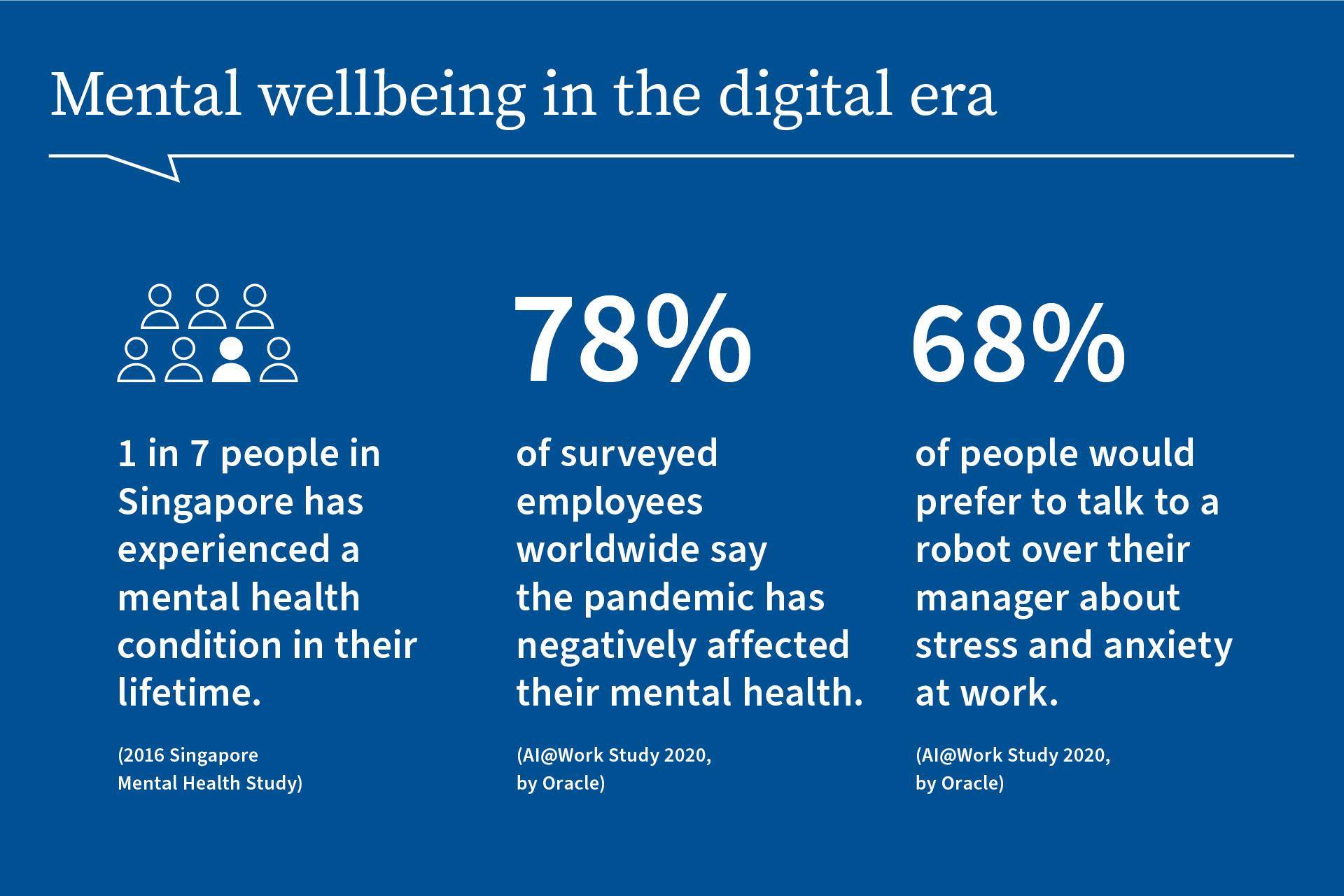Rethinking mental wellbeing in the digital era
Based in Singapore, Holmusk is a data science and healthcare technology firm that works with government departments, academic institutes, pharma, healthcare providers, companies and insurers to develop evidence-based models connecting mental and chronic health conditions.
Holmusk is currently working with Singapore’s National Healthcare Group (NHG) and Institute of Mental Health (IMH) to develop tools for earlier detection and intervention in mental health disorders, such as depression and schizophrenia, by using advanced analytics and digital technology.
The impact of COVID-19
The timing is apposite. COVID-19 has dramatically increased emotional stress through lockdown loneliness as well as job-related and financial insecurity.
Although this is stimulating new discussions about mental health, the long-term implications remain uncertain. Various studies show that acute stress can become chronic over time, and untreated mental wellbeing issues may have various consequences for human health.
Paul Feldhausen says the pandemic is completely reframing the debate around mental health issues. “Governments are starting to think about the medium and long-term effects of these acute stressors across the population,” he says. “We’ve seen a dramatic shift in the need for alternative solutions across South East Asia. COVID-19 pushed our mental wellness roadmap forward by about 12 months.”

The rising appeal of telehealth services
Another outcome of COVID-19 has been that more people are seeking help for mental health issues, such as anxiety and depression, via telehealth and digital services. The value of these platforms is that they are accessible at low cost and can be used in home environments rather than having to visit a consulting room. This encourages users to become more comfortable analysing and discussing their own issues.
For insurers, this has accelerated an issue that was developing before the pandemic.
“For about the past two years, there has been lot of interest from mental health professionals who feel more can be done to raise awareness and reduce the social stigma around mental health,” says Dr Sharliza Mohd Salleh, Head of Health Solutions, P&C, Hannover Re Malaysian Branch. “They also tell us that it is hard for people suffering from mental health illnesses to get insurance coverage and they would like to see more mental health benefit in the insurance product.”
During the pandemic, Hannover Re in Malaysia has taken steps to support its own staff with their mental health.
“We introduced a corporate program enabling staff to download a digital application and access an online counsellor during office hours, five days a week,” says Dr Sharliza. “The digital chat app helps our staff to talk about stress-related issues, like anxiety or depression, and learn positive thought techniques. They can be discreet and don't have to tell their real name. Privacy is important, as it alleviates pressure and means they can converse in their own time and at their own speed.”

Creating more meaningful insights
Paul Feldhausen notes that enhanced connectivity between technology and personal wellbeing can generate deeper, more meaningful insights. This will enable insurers to more accurately personalise policies related to mental health.
“With digital interventions, you can monitor and track mental health conditions and provide objective measures that were not previously identifiable. That’s hugely important for understanding how people progress in terms of mental health issues,” he says.
“Using digital video machinery, for example, you can recognise behaviour patterns that may not be picked up in normal day-to-day interactions. Also, voice recognition technology means we can detect subtle changes in voice patterns. This helps us detect novel disorder characteristics or digital biomarkers not just to diagnose but to monitor the progression of mental health issues and see whether people are improving or not.”

Data-driven policies covering mental health
Everyone deals with mental health in different ways. Developing a better understanding of how different socio-economic and financial stresses affect the mental wellbeing of people can help drive different interventions.
“We don't want to make any assumptions that what works in one country or one region can be kind of copied and lifted to another market,” says Feldhausen. “Our collaboration with the NHG and IMH will look at Singapore-specific interventions and how we can adapt these throughout the region.”
As a result, powerful data analytics supported by expert coaching tools could radically change the way insurance policies covering mental health are developed in future.
“By creating partnerships with insurers and companies, we can help them start to identify risk, look at different preventative measures and provide accessible interventions to individuals,” says Feldhausen. “We can expand mental health benefits using digital counselling, and triage higher-risk individuals to psychology or even psychiatry – bringing people into the right care setting at the right time.”
This could be hugely important for managing mental wellbeing risks – and help more people enjoy healthier and happier lives.
Related solutions
User questions
Answered questions
Unanswered questions
Views: 10427
Downloads: 0
| 100 % | |
| 0 % | |
| 0 % | |
| 0 % | |
| 0 % |
Page is favored by 0 user.
Contact inquiries: 0


